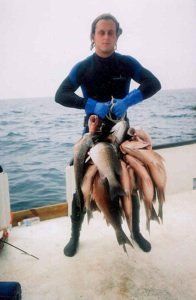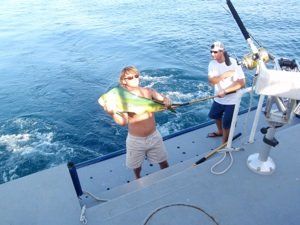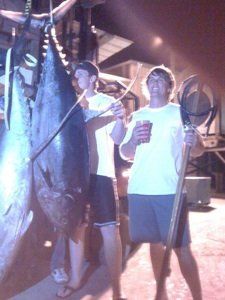Outer Space Underwater
By Blake Terry
Ever since the first time my dad took me offshore fishing, I have always wanted to know what it was like underneath the surface of the deep ocean. It seemed that every time we went fishing, we loaded the boat down with many different species of fish. It made me wonder about what life is actually like under the ocean.
The older I became and the more I learned about fishing, I began to realize that these different species of fish all have their own characteristics and behavior. Then I started focusing on fishing in deeper waters to find bigger fish. I started catching large amberjacks and groupers and my brain began wanting to explore the deep ocean even more. I kept on fishing from my boat with the dream of one day being able to swim with these giant fish myself.
My ambition to become a diver became too strong by the time I turned the age of 16. I went to my local dive shop and purchased my first set of snorkeling gear. I was now finally about to take the first step in pursuing my dream of making my first deep dive. After getting comfortable with my snorkeling gear, I scheduled my classes to get certified in scuba diving.
As my diving classes went on, I began to understand that diving to a very deep depth would take some serious training and skill. I was taught that the recreational sport diver should not go past one hundred feet. This started to make my dreams unrealistic at first, but I was not going to give up without putting up a struggle.
I finished my in-class training and headed to the Gulf of Mexico to finally make my first underwater exploration. It was everything I hoped for it to be and more. The fish, along with the coral reef along the structure of the rig, fascinated me. My interest in these underwater ecosystems grew stronger and I began diving every chance I could.
Some of my veteran diving partners started coaching me along way. I became more experienced as time went on and I started diving to deeper depths. Then it was like dejavu from my early days of fishing because as I approached deeper depths, the fish grew larger. I was only capable of going to a certain limit on my depth because I was breathing compressed air rather than a mixture of gases.
The deeper I would go, the more nitrogen my body would absorb. I could only go so deep before my air became poisonous to my body. My deepest point was two hundred and twenty feet beneath the surface. The best way I could describe it was it felt like outer space. The fish around me were of great size, but I was looking down another one hundred feet and those fish were even larger. I knew if I wanted to truly see what was down there, I would have to extend my training more.
My research continued and I found an article online about deep sea diving that interested me. It gave me a better view about the risks involved with deep diving. Technical dives, or deep dives, can range from one hundred and thirty feet to over five hundred feet in depth. Special equipment such as gas mixtures, decompression rules, extensive training, and a level mind are required to perform a technical dive. Most people do not dive to these depths for no reason. They are either exploring something such as a ship wreck or they have to complete a job. Over the past few years, there have been controversies about what type of air to breath in order to reach these deep depths without it becoming poisonous. Some people believe breathing compressed air works as long as the person has a tolerance for nitrogen narcosis. Research has proven that breathing mix gas is the safest way to dive because it prevents the effects of nitrogen narcosis. Nitrogen narcosis occurs when your body absorbs too much nitrogen from diving too deep. One breath at two hundred feet is equivalent to twenty breaths on the surface. Mix gases called trimix are mainly used today for dives deeper than one hundred feet.
As my diving went on, all my questions for the recreational diver had been eventually answered. The next person who came to my mind is a commercial diver. A commercial diver is generally associated with the oil field and spends most of his or her time working under water. Commercial divers are a rare breed of people because their jobs are more dangerous than the average person. I figured the best place for further information about the deep ocean would be from someone who is in that environment every day. The elite group of commercial divers is known as SAT divers. They perform the deep water jobs in the commercial industry. Sometimes they have to stay in the decompression chamber for as long as forty days to clean their bodies because they have to dive so deep. They have seen grouper larger than words can describe. I still find it hard to comprehend even after I have heard them first hand.
My diving partners and I had always talked about what we would see down below our deepest depths. Then one day we read a story about a man that fulfilled the same lifelong dream we all have had. The forty year old man explored a ship wreck that was four hundred and twenty-five feet deep. His reason behind it was to shoot a giant grouper. This was a technical dive that required a team of individuals working together to make his dream happen. It was a dive that was very risky because if one thing went wrong, his life was over. If anything went wrong while he was down there, it had to be fixed right away without panicking since he was not capable of rushing to the surface. The man and his dive buddy had to breathe a mixture of gases so their bodies would not be poisoned with the wrong gas. They dove down to the wreck and there were grouper everywhere between fifty and one hundred pounds. Then he spotted the giant four hundred and three pound grouper swimming straight towards him.
He shot two shafts in his head and killed it instantly. That is something he will remember for the rest of his life. Although his story sounded too dangerous, he survived and was able to tell the story because of his skills and the support of his crew. Diving down to a depth like that is not the idea of the average person. It takes a level mind along with a great crew to pursue a dream like that. One day I will hopefully be able to fulfill my dream as he did. I have got a few other goals I want to accomplish in life before I take a risk of that nature. Until that day comes where I get to dive on my deep wreck, I will have to keep dreaming of what it would be like.
Blake Terry (BT) Memorial Foundation
Non-Profit Organization for Search and Rescue for Recreational Divers
Contact Us
853 Martinez Road
Thibodaux, LA 70301
985-665-3851
Copyright © 2021 BT Memorial Foundation. All rights reserved.



